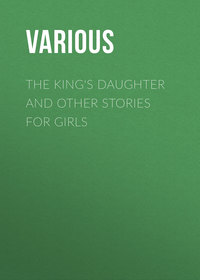Kitabı oku: «The King's Daughter and Other Stories for Girls», sayfa 10
THE IMPOSSIBLE YESTERDAY
She was a tiny girl, playing by herself in a wide, grassy yard. The older children had gone to school, but she, too young for that, was busying herself with putting in order a playhouse in an arbor—arranging it as nearly as possible as it had been the day before, when she and two or three little mates had enjoyed such a merry time there. To and fro trudged the tireless feet, patiently the small hands worked, and at last all was complete. Then the young worker looked about her, and slowly a shadow of disappointment crept over the face that had been so eager. Something was lacking. Everything was in the remembered order, but it did not seem the same. She studied it for a minute or two, then walked away and sat down on a sunny doorstep. The mother found her there a little later, a listless, quiet little figure.
"Are you tired of your playhouse already, dear?" she asked.
The childish eyes were uplifted with a look of wistful wonder in them, and the answer came slowly.
"I can't do it—I can't make yesterday over again."
It was the hopeless task that in one form or another we all undertake, and with which many darken their whole lives because they will not learn that it is an impossible one. Yesterday's roses died with the day, yesterday's manna was only for yesterday's need, but there are new flowers and new food for to-day from the same gracious hand that bestowed the other, if only we will go cheerfully and trustingly forward. The treasures and pleasures we have had are for memory and thanksgiving, but the moment we sit down beside them to grieve or to try to reconstruct them out of their ruins we have changed them from a blessing to a hindrance. We cannot make yesterday over again.
A CHILD'S PUZZLE
Meg had been playing in the garden all the morning, and when mama called her in she had earth on her hands, and smuts on her face, and she looked such a grubby little thing.
Mama smiled. "You have been having a good time, Meg," she said.
And she put a tin bason with some soap and warm water in it on a chair where Meg could reach.
"Now, then, wash your hands and face, dear. Dada will soon be in for dinner."
But Meg pouted. "I don't want to wash," she said. "I am not dirty."
Mama waited a little, but when she saw that Meg did not begin to wash, she said, quite gravely:
"You cannot sit at the table, as you are, dear. If you do not wash, then you must go without your dinner."
Meg stood a minute, then, as she saw that mama was quite firm, she put her hands into the water and began to wash and scrub them.
Lucy is older than Meg, and she had looked on all the time to see what Meg would do. When Lucy saw her begin to wash and be good, she said:—
"Why is it, mama, that you and dada can do just as you like about everything, but we children have to do as you tell us all the time? I don't think it is fair. I wish we could do as we like, too."
Mania did not speak for a moment. In her heart she said, "Lord help me to make this plain to my little girls."
"Did Meg have to wash?" she asked them.
"Yes," said Lucy. "If not, she would have to—"
"Bear the punishment," said mama. "You say, Lucy, that dada and I do just what we choose, and that is quite true. But if we choose to do wrong, then we have to be punished too, and the punishment is far worse than any that dada or I can give you, for it comes from God.
"Little children do not always know right from wrong, so in order to help them and make right easy, God gives them parents and teachers to praise them when they are good"—and here mama laid her hand on Meg's head—"or else to punish them when they are naughty.
"My two little girls may do just as they choose, as long as they choose to do what is right, and then when they are big and there is no mama to tell them all the time what to do, I hope they will do right of themselves."
HOW ONE GIRL SHOWED THAT SHE WAS SORRY
In a little village lived a poor old woman with a pretty granddaughter. One day the aged woman went out without her crutch, but her granddaughter was near to serve her as a support. It continued thus for a long time. To the promenade, to church, or market, the good old grandame no longer used her crutch, but leaned on her granddaughter. There was much prattling about this in the village, and all wondered. At last they found out the cause. The granddaughter, in a fit of passion, threw her grandmother's crutch in the fire, and the old woman was too poor to buy another. The hasty girl cried and repented, and the frail old woman pardoned her; but, to make reparation, her grandchild never quitted her for an instant, and served as a faithful crutch, till she saved up money enough to buy a substantial new crutch, on which were these words, "Repentance and restoration."
